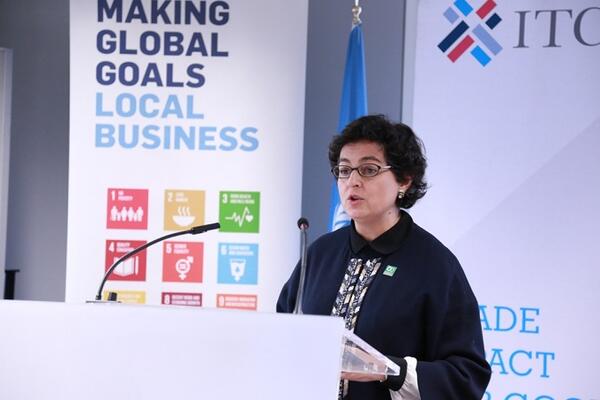
Bringing down legal barriers to women’s economic empowerment An economic and business imperative
16 January 2016 - ITC
Ladies and Gentlemen, Dear Friends
It is a pleasure for me to welcome you to ITC today, for this timely dialogue on women’s economic empowerment. I thank Lise Kingo and the team at the Global Compact, Amanda Ellis at East West Centre, Phumzile Mlambo Nguka at UN Women, Michael Moller and Ambassador Pamela Hamamoto, our friends at the International Gender Champions Geneva and all the supporting organizations who pulled this event together. The year starts with a strong message on partnership for results.
Gender equality is both a human rights imperative as well as an incredibly powerful economic opportunity. This is reflected in the near-universal ratification of the Convention on the Elimination of All Forms of Discrimination against Women (CEDAW) and the central role of gender equality in the UN Sustainable Development Goals.
And yet, we are falling short. The World Economic Forum recently reported a slowdown in progress towards closing the gender wage gap: at current rates, it will now take 170 years, instead of a mere 118, to achieve economic parity. In spite of our formal commitments to equality, gender inequalities are still written in to the law. And this is what we want the focus to be at today’s event.
The World Bank finds that 90% of countries have at least one legal impediment to women’s economic opportunities.
In 17 countries, for example, the law stipulates that a married woman cannot leave her home without her husband’s permission or additional legal documentation. This obviously affects her ability to have a job or to start, let alone run a business.
These laws endure despite the fact that countries with more gender-based legal differences perform worse on a wide range of economic and social variables.
Even where discriminatory laws are on the books but not enforced, they reinforce gender biases and entrench a discriminatory social and cultural environment.
Greater gender equality is associated with better human development indicators, higher per capita incomes, faster economic growth and stronger national competitiveness.
Whether in terms of our economies or our societies, we cannot afford gender inequality. Laws are a matter for governments and parliaments.
I am pleased to see Women in Parliaments Global Forum here today. They must lead on this, together with our colleagues in the Inter Parliamentary Union (IPU).
Today’s gathering from the development community and business will look at specific incentives and measures to accelerate the elimination of discriminatory legal barriers. I look forward to learning from them about how we can work together to tackle the inequalities that women still face every day.
2017 starts with plenty of bad news on gender equality. Thus is why we must now move from promises to results. Anchoring change and demonstrating results will help us win over skepticism and opposition.
Thank you for your attention.



